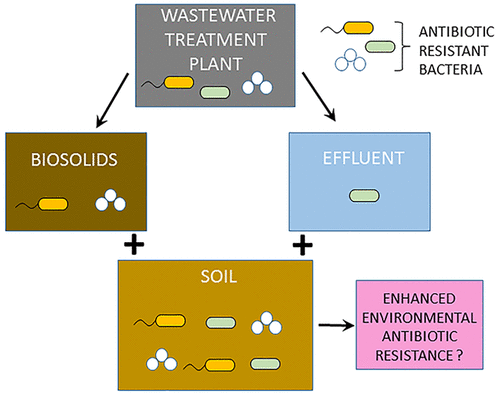当前位置:
X-MOL 学术
›
Environ. Sci. Technol.
›
论文详情
Our official English website, www.x-mol.net, welcomes your
feedback! (Note: you will need to create a separate account there.)
Antibiotic Resistant Bacteria in Municipal Wastes: Is There Reason for Concern?
Environmental Science & Technology ( IF 10.8 ) Pub Date : 2018-03-19 00:00:00 , DOI: 10.1021/acs.est.7b04360 Ian L. Pepper 1 , John P. Brooks 2 , Charles P. Gerba 1
Environmental Science & Technology ( IF 10.8 ) Pub Date : 2018-03-19 00:00:00 , DOI: 10.1021/acs.est.7b04360 Ian L. Pepper 1 , John P. Brooks 2 , Charles P. Gerba 1
Affiliation

|
Recently, there has been increased concern about the presence of antibiotic resistant bacteria (ARB) and antibiotic resistant genes (ARG), in treated domestic wastewaters, animal manures and municipal biosolids. The concern is whether these additional sources of ARB contribute to antibiotic resistance levels in the environment, that is, “environmental antibiotic resistance.” ARB and ARG occur naturally in soil and water, and it remains unclear whether the introduction of ARB in liquid and solid municipal and animal wastes via land application have any significant impact on the background levels of antibiotic resistance in the environment, and whether they affect human exposure to ARB. In this current review, we examine and re-evaluate the incidence of ARB and ARG resulting from land application activities, and offer a new perspective on the threat of antibiotic resistance to public health via exposure from nonclinical environmental sources. Based on inputs of ARBs and ARGs from land application, their fate in soil due to soil microbial ecology principles, and background indigenous levels of ARBs and ARGs already present in soil, we conclude that while antibiotic resistance levels in soil are increased temporally by land application of wastes, their persistence is not guaranteed and is in fact variable, and often contradictory based on application site. Furthermore, the application of wastes may not produce the most direct impact of ARGs and ARB on public health. Further investigation is still warranted in agriculture and public health, including continued scrutiny of antibiotic use in both sectors.
中文翻译:

城市废物中的抗生素抗性细菌:值得关注吗?
最近,人们越来越关注在处理过的生活废水,动物粪便和市政生物固体中是否存在抗生素抗性细菌(ARB)和抗生素抗性基因(ARG)。令人担忧的是,这些额外的ARB来源是否有助于环境中的抗生素耐药性水平,即“环境抗生素耐药性”。ARB和ARG天然存在于土壤和水中,目前尚不清楚通过土地施用将ARB引入液体和固体城市和动物废物中是否会对环境中抗生素耐药性的背景水平产生任何重大影响,以及它们是否影响人类接触ARB。在本次审查中,我们检查并重新评估了土地应用活动导致的ARB和ARG的发生率,并通过暴露于非临床环境源为抗生素耐药性对公共健康的威胁提供了新的视角。根据来自土地应用的ARB和ARG的输入,由于土壤微生物生态学原理造成的它们在土壤中的命运以及土壤中已经存在的本机背景ARB和ARG的本底水平,我们得出结论,尽管土地应用会暂时提高土壤中的抗生素抗性水平对于废物,其持久性得不到保证,实际上是可变的,并且根据应用场合通常是矛盾的。此外,废物的使用可能不会对ARGs和ARB对公共卫生产生最直接的影响。仍然有必要在农业和公共卫生领域进行进一步调查,包括继续对两个部门的抗生素使用情况进行审查。
更新日期:2018-03-20
中文翻译:

城市废物中的抗生素抗性细菌:值得关注吗?
最近,人们越来越关注在处理过的生活废水,动物粪便和市政生物固体中是否存在抗生素抗性细菌(ARB)和抗生素抗性基因(ARG)。令人担忧的是,这些额外的ARB来源是否有助于环境中的抗生素耐药性水平,即“环境抗生素耐药性”。ARB和ARG天然存在于土壤和水中,目前尚不清楚通过土地施用将ARB引入液体和固体城市和动物废物中是否会对环境中抗生素耐药性的背景水平产生任何重大影响,以及它们是否影响人类接触ARB。在本次审查中,我们检查并重新评估了土地应用活动导致的ARB和ARG的发生率,并通过暴露于非临床环境源为抗生素耐药性对公共健康的威胁提供了新的视角。根据来自土地应用的ARB和ARG的输入,由于土壤微生物生态学原理造成的它们在土壤中的命运以及土壤中已经存在的本机背景ARB和ARG的本底水平,我们得出结论,尽管土地应用会暂时提高土壤中的抗生素抗性水平对于废物,其持久性得不到保证,实际上是可变的,并且根据应用场合通常是矛盾的。此外,废物的使用可能不会对ARGs和ARB对公共卫生产生最直接的影响。仍然有必要在农业和公共卫生领域进行进一步调查,包括继续对两个部门的抗生素使用情况进行审查。











































 京公网安备 11010802027423号
京公网安备 11010802027423号